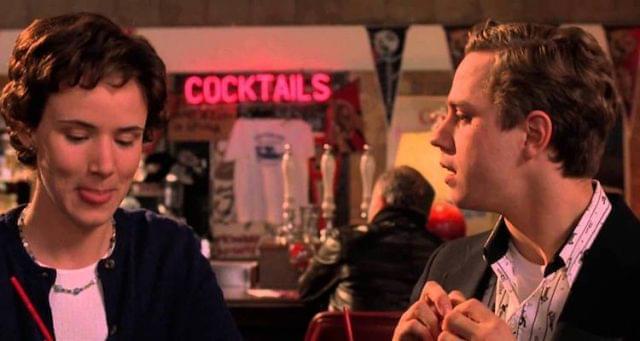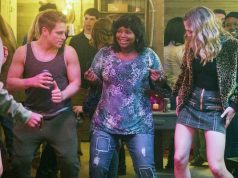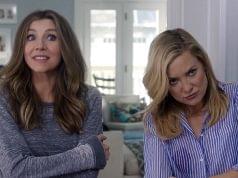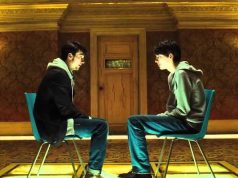
It’s tricky to write about “The Other Sister,” because it’s about two young mentally handicapped people who fall in love, and that subject is very sensitive, and the word “retarded” is often used as a playground insult, and by “playground” I mean “Internet.” There’s also the fact that the term “mentally retarded” is never actually used in “The Other Sister,” not even with regard to the characters who are mentally retarded. But they obviously ARE. I mean, that’s what the whole movie is ABOUT. If they were just kind of slow, there wouldn’t be a story, since slow people fall in love all the time. Britney Spears and Kevin Federline, for example. But that’s a whole other can of worms, because whom did I just insult in that sentence? Britney and K-Fed, or mentally handicapped people?
You can see why addressing “The Other Sister” is a minefield, and why it’s good that I’m a sensitive writer with an appreciation for nuance.
“The Other Sister” belongs to the genre of retardsploitation, where weak-willed audiences are manipulated into feeling like they’ve been “moved” by hack filmmakers who present condescending views of the mentally handicapped, usually with the cutesy underlying message of “Aw! Look how adorable the retarded people are! They say the most precious things!” “I Am Sam” is probably the most famous retardsploitation film, but only because it starred A-list actor Sean Penn. “The Other Sister” is much worse and deserves to be more famous; sadly, it only stars Juliette Lewis and Giovanni Ribisi.
Lewis plays Carla Tate, who has just returned to her wealthy parents’ Bay Area home after graduating from a special high school for special kids, which her parents sent her to several years ago after they got fed up with all her damn specialness. She has two older sisters, one of whom, Caroline (Poppy Montgomery), is about to get married, and the other of whom, Heather (Sarah Paulson) is a lesbian. This second bit of information is important because it allows the film to address not just one but two Very Important Topics. The girls’ mother, played by Diane Keaton, has trouble accepting that Carla is “different” and that Heather is “gay.” Their father, played by Tom Skerritt, does the right thing by just drinking all the time.
Carla goes to college — well, OK, a polytechnic — to take some computer classes, and it’s here that she meets Daniel (Ribisi), who is “special” just like her. He says he can drive, and it turns out he means he can ride a bicycle! He wants to take her on a date to someplace nice, so they go to the Greyhound bus station and eat food from vending machines! ISN’T THAT ADORABLE??
Daniel lives by himself, funded by his absentee father, and seems to function well enough on his own, despite his fundamental misunderstanding of many basic things. (Again, the Britney/K-Fed rule applies.) This inspires Carla to consider moving into her own apartment, too. She mentions it in passing one day, very casually, like it’s just a thought she had, nothing serious. Her mom’s response should be something along the lines of, “Well, maybe, someday. We can discuss it.” Instead, Mom freaks out and says no no no no there’s no way Carla can live on her own no no no she’ll set the building on fire no no no she’ll be dead within a week. The amazing thing about this movie is that no matter how wrong and misguided Carla’s ideas are, you somehow wind up taking her side simply because her mother is so much worse, and because at least Carla has an excuse.
Carla and Daniel’s relationship comprises the big, slobbery heart of the movie. They watch “The Graduate” together and love the ending, when Benjamin rescues Elaine from marrying the other guy. “Did they live happily ever after?” Carla asks. “I don’t know,” Daniel says. “They didn’t make a ‘Graduate 2.'” Never mind that this dialogue sounds like it was written for sitcom characters, and the disturbing implication that sitcom characters and mentally impaired people can be written for interchangeably. Consider instead that the ending of “The Graduate” isn’t necessarily a happy one anyway, since Benjamin’s interruption of Elaine’s wedding might have been a mistake. I wouldn’t expect Carla and Daniel to get that, but I would expect Garry Marshall, who directed and co-wrote “The Other Sister,” to have caught it. Instead, he recreates that famous scene — complete with a Simon & Garfunkel cover on the soundtrack — later, when Daniel barges into Caroline’s wedding to propose to Carla, who’s a bridesmaid. Obviously the ambiguity of the “Graduate” ending eluded Marshall, since he presents Daniel and Carla’s eventual marriage as a 100-percent super-awesome thing that will lead to nothing but sunshine and buttercups.
But I have gotten ahead of myself! First, Carla gets her own apartment. Mom fusses over the details, makes sure there are multiple fire extinguishers on hand, and leaves. Five minutes later, the building is on fire and Carla is dead.
No, I kid. Everything is fine. Being mentally retarded, we learn, doesn’t actually have any downsides. You’re still able to do absolutely everything that everyone else does. The only difference is that when you have dialogue like this —
CARLA: I wonder who thought up sex in the first place.
DANIEL: I think it was Madonna, actually.
— it’s “lovable and precocious” rather than “stupid and contrived.”
The reason Carla and Daniel are discussing sex is that they want to do it. I mean, who doesn’t, right? It starts when they’re making out on the couch, and Carla stops and says, “Strange things are happening to my body.” These strange things turn out to be separate from the strange things that are usually happening to Juliette Lewis’ body. They decide to have sex, so Daniel puts on romantic music, which to him means a recording of a marching band playing “Seventy-Six Trombones,” and no, I’m not kidding. He has a thing for marching bands, you see. Oh, the mentally handicapped and their quirks!
Up next is a Christmas party at the Tate family’s country club. Daniel is able to get very drunk by taking advantage of the club’s strict policy of serving alcohol to everyone, including people who look like they might be underage and who are obviously mentally impaired and who clearly have been over-served already. Properly fortified, Daniel takes the stage, interrupts the live music, and slurs his drunken love for Carla into the microphone for all to hear. He also mentions that on Thanksgiving, he and Carla had sex. This is the button on a scene that has already been tremendously uncomfortable and embarrassing, the kind of thing that’s cringe-inducingly funny on “The Office” but unbearable here, where it’s being played for drama rather than laughs. Which isn’t to say it’s not funny, only that it wasn’t supposed to be.
Carla is horribly upset to be humiliated in this way, and Juliette Lewis does a lot of sob-screaming to Diane Keaton out on the country club’s lawn. Carla and Daniel break up now, of course, which means we must endure a montage of scenes in which they mope around, missing each other, including one where Daniel glumly goes through the motions of pretending he’s in a marching band, but he’s too sad, so he can only pretend half-heartedly. Finally, on the eve of Carla’s sister’s wedding, Daniel boards a train bound for Florida, where his mother lives, only to remember (but miss the point of) the ending of “The Graduate,” leading him to get off the train in El Paso and hitchhike back to San Francisco. He covers this distance (approximately 1,000 miles) in less than 24 hours, arriving at the church just in time to crawl into the organ loft, cause a scene, and propose marriage to Carla. This time, she’s not humiliated to be embarrassed in public; she’s delighted! Her sister Caroline doesn’t mind her wedding being hijacked, either. Don’t forget the message of the film: Everything Carla or Daniel does is A-OK.
But Carla’s mother opposes their marriage, not because she dislikes Daniel, but because she’s concerned about whether they can adequately take care of each other, and because Carla is, what, 19 or 20? And she’s never been in love with anyone before? Mom tells Carla this, and Carla does some more sob-screaming. This sob-screaming, which involves sobbing while screaming (if that wasn’t evident), is the primary cudgel in Lewis’ arsenal of blunt acting instruments. She sob-screams: “No matter how long I wait, I can’t be a painter, and I can’t play tennis, and I’m not an artist. But I know how to do some things! And I can LOVE!” This is the scene that would be shown at the Oscars in an alternate universe, one where shamelessly manipulative performances in shamelessly manipulative movies, other than “Crash,” are honored.
Strangely, after this scene, we cut almost immediately to the day of Carla and Daniel’s wedding, with Mom refusing to attend the service. While Garry Marshall has never made a film that wasn’t too long, and while this one has already worn out its welcome by this point, for some reason NOW he decides to skip stuff and get right to the point. Of course, what he skips might have been relevant — people trying to persuade Mom to change her mind, people making sure Carla has some idea what she’s getting herself into, etc. — but there’s always a trade off. If Marshall had included things like that, he’d have had less time to devote to scenes of Ribisi and Lewis babbling at each other in their marble-mouthed impersonations of what they think retarded people sound like.
You may rest assured that Mom comes around in the end and supports the marriage. Everyone is very happy to see Carla and Daniel get into their “just married” car and drive immediately into a ditch, where they catch on fire and die. No, again, I kid. They didn’t make an “Other Sister 2,” due to sanctions imposed by the United Nations, but I’m pretty sure Carla and Daniel live happily ever after, their charmed, perfect lives blending together blissfully for the next six decades. Why Carla’s mom was such a worry-wart, I don’t know, but I do know one thing: Boo for mothers! Seriously, what did they ever do for anyone?
— Film.com





